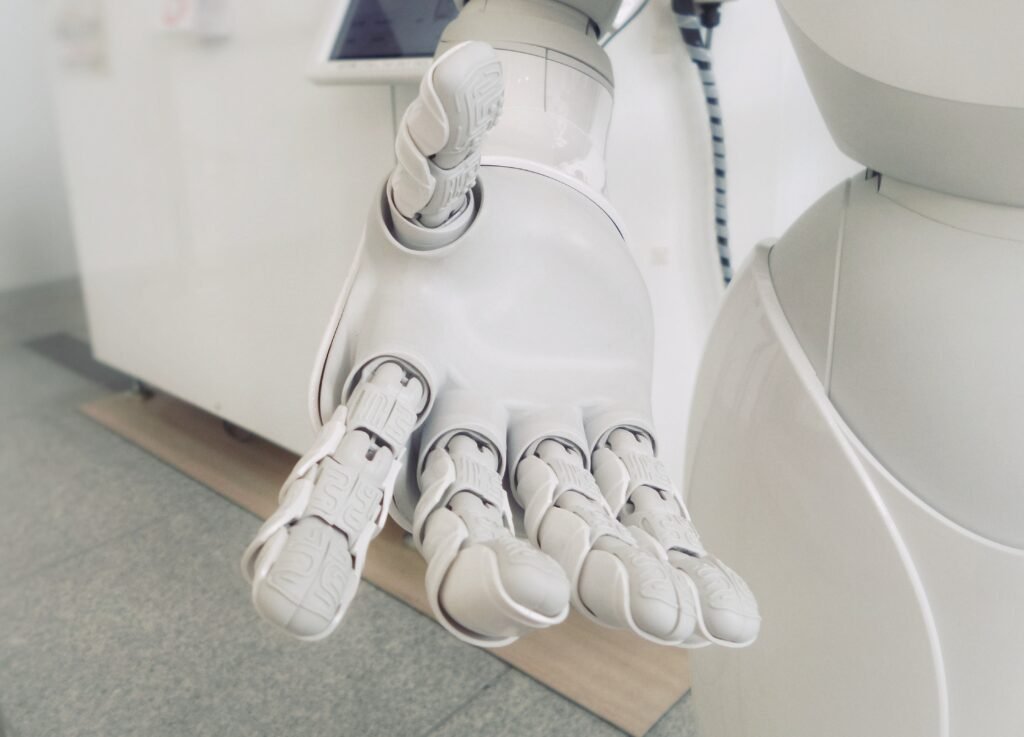Have you ever wondered if Artificial Intelligence is real or just a work of science fiction? Well, buckle up because we’re about to explore this captivating topic! Join us as we unravel the mysteries behind AI and navigate through the realms of technology and innovation. From chatbots to self-driving cars, AI has become an integral part of our lives, and it’s time to separate fact from fiction. So, get ready to dive into the world of Artificial Intelligence and discover its true potential.

What is Artificial Intelligence?
Artificial Intelligence (AI) refers to the simulation of human intelligence in machines that are designed to think and learn like humans. It involves the development of computer systems capable of performing tasks that would typically require human intelligence, such as speech recognition, problem-solving, decision-making, and pattern recognition. AI has garnered significant attention in recent years and is revolutionizing various industries and aspects of our daily lives.
Definition of AI
Artificial Intelligence can be defined as a branch of computer science that focuses on creating intelligent machines capable of performing tasks that would normally require human intelligence. These machines are equipped with the ability to analyze data, draw conclusions, make decisions, and adapt to new situations. AI is not limited to a single technology or approach but encompasses a broad range of techniques, including machine learning, natural language processing, computer vision, and robotics.
AI applications in real world
The applications of AI in the real world are vast and diverse. AI technology is already being used in several industries and sectors, including healthcare, finance, transportation, agriculture, and entertainment. In healthcare, AI-powered systems can assist in diagnosing diseases, analyzing medical images, and developing personalized treatment plans. AI also plays a crucial role in the financial industry, where it helps with fraud detection, credit scoring, and algorithmic trading. Moreover, AI is transforming the transportation sector with self-driving cars and optimizing routes for logistics companies.
History of Artificial Intelligence
Origins of AI
The origins of AI can be traced back to the mid-20th century when the idea of creating intelligent machines emerged. The term “artificial intelligence” was coined in 1956 at the Dartmouth Conference, where a group of researchers gathered to explore the possibilities of creating machines that could mimic human intelligence. The early years of AI research focused on developing rule-based systems and symbolic AI, where programs were designed using explicit rules and logic to simulate human decision-making.
Development of AI over time
Over the years, AI has evolved and progressed significantly. In the 1950s and 1960s, AI researchers focused on developing logic-based systems and expert systems, which aimed to capture human expertise in specific domains. However, these early approaches proved to be limited in their capabilities and were unable to handle complex real-world problems. In the 1980s, AI entered the era of machine learning, with researchers developing algorithms that could learn from data and improve their performance over time.
Advancements in computing power and the availability of large datasets led to the rise of machine learning and deep learning in the 21st century. Machine learning algorithms, such as neural networks, enabled computers to analyze vast amounts of data and extract meaningful patterns. This led to breakthroughs in areas such as computer vision, natural language processing, and speech recognition. The development of AI has been driven by both academic research and the commercial sector, with companies investing heavily in AI technologies to gain a competitive edge in various industries.
Types of Artificial Intelligence
Narrow AI
Narrow AI, also known as weak AI, refers to AI systems designed to perform specific tasks or functions within a limited domain. These AI systems excel at specific tasks but lack the general intelligence and adaptability of human intelligence. Examples of narrow AI include voice assistants like Siri and Alexa, recommendation algorithms used by streaming platforms, and spam filters in email services. Narrow AI has found practical applications in many areas, enhancing productivity and improving efficiency.
General AI
General AI, also known as strong AI or AGI (Artificial General Intelligence), refers to AI systems that possess the ability to understand, learn, and apply knowledge across multiple domains. General AI can perform any intellectual task that a human being can do and can adapt to new situations and learn from experience. While general AI is still largely theoretical, it represents the goal of AI research and has been the subject of much speculation and debate.
Superintelligent AI
Superintelligent AI refers to AI systems that surpass human intelligence in virtually every aspect. This level of AI is purely hypothetical and is often the subject of science fiction novels and movies. Superintelligent AI would possess cognitive abilities far superior to humans and would potentially be capable of self-improvement, leading to a rapid acceleration of intelligence. The concept of superintelligent AI raises complex ethical and philosophical questions about the impact of such technology on human society.
Current State of Artificial Intelligence
AI technologies
The current state of AI is marked by rapid advancements in various technologies and techniques. Machine learning, particularly deep learning, has gained significant attention in recent years due to its ability to process and analyze large amounts of data. Deep learning algorithms, modeled after the human brain’s neural networks, have achieved remarkable success in areas such as image recognition, natural language processing, and autonomous driving. Other AI technologies, such as reinforcement learning and genetic algorithms, are also contributing to the development of more sophisticated AI systems.
AI in various industries
AI has made significant inroads into various industries, revolutionizing the way tasks and processes are performed. In healthcare, AI is being used for disease diagnosis, drug discovery, and personalized medicine. AI-powered chatbots and virtual assistants are transforming customer service in industries such as banking, e-commerce, and telecommunications. AI algorithms are also being employed in finance and investment to analyze market trends and assist in decision-making. Additionally, AI is being utilized in manufacturing, agriculture, and logistics to optimize operations and increase efficiency.
Limitations of AI
While AI has made significant progress, it still faces certain limitations and challenges. One limitation is that AI systems often require large amounts of labeled data to train effectively. Obtaining and labeling such data can be time-consuming and costly. Additionally, AI systems may exhibit biases if trained on biased data, leading to potentially unfair outcomes. The lack of interpretability in some AI models is another challenge, as it can be difficult to understand the reasoning behind AI-driven decisions. Ensuring the ethical use of AI and addressing these limitations are ongoing areas of research and development.

Ethical Considerations of Artificial Intelligence
AI and job displacement
One ethical consideration of AI is its potential impact on the workforce. As AI technologies continue to advance, there is concern that automation and AI-driven systems may replace human workers in certain industries. Jobs that involve repetitive tasks or routine decision-making are particularly vulnerable to automation. However, it is important to note that AI also creates new job opportunities, as it requires human expertise in areas such as AI development, data analysis, ethics, and decision-making. Ensuring a smooth transition and providing reskilling opportunities for displaced workers are crucial considerations in the ethical deployment of AI.
AI and privacy concerns
The widespread adoption of AI and the collection and analysis of large amounts of personal data raise concerns over privacy and data protection. AI systems often rely on access to personal information, such as medical records or financial data, in order to make accurate predictions and decisions. However, the use of such sensitive data raises questions about consent, control, and the potential for unauthorized access or misuse. It is essential for organizations and policymakers to establish robust data protection frameworks and protocols to address these privacy concerns and protect individuals’ rights.
AI and bias
Another ethical consideration of AI is the potential for bias in AI algorithms and decision-making. AI systems are trained on data that may contain inherent biases, such as gender or racial biases, which can result in discriminatory outcomes. As AI systems become increasingly integrated into various aspects of society, it is crucial to address bias and ensure fairness and equity. Transparent and accountable AI development, diverse and inclusive datasets, and ongoing monitoring and evaluation are key steps in mitigating bias in AI applications.
Debunking AI Myths
AI surpassing human intelligence
There is a common misconception that AI will soon surpass human intelligence and render humans obsolete. While AI has made significant progress, the development of human-level or superintelligent AI is still largely theoretical. The current state of AI is characterized by narrow AI systems that excel in specific tasks but lack the general intelligence and adaptability of humans. While AI has the potential to augment human capabilities and automate certain tasks, it is unlikely to fully replicate or replace human intelligence in the near future.
AI taking over the world
Another myth surrounding AI is the fear that AI will take over the world and pose a threat to humanity. This idea is often perpetuated in science fiction movies and novels. However, it is important to distinguish between narrow AI and general AI. Narrow AI is designed for specific tasks and does not possess the capabilities or intentions to take over the world. General AI, while a subject of speculation, remains purely hypothetical and raises complex ethical considerations. The development and deployment of AI systems should be guided by ethical principles and human values to ensure their responsible use.

Future of Artificial Intelligence
Advancements in AI research
The future of AI holds great potential for further advancements and breakthroughs. AI research is constantly evolving, driven by both academic pursuits and the commercial sector’s demand for innovative applications. As computing power continues to increase and new algorithms and techniques are developed, AI systems are likely to become more capable and intelligent. The ongoing exploration of areas such as explainable AI, quantum AI, and neuromorphic computing indicates that AI will continue to push the boundaries of what is possible.
AI in everyday life
AI is expected to become increasingly integrated into everyday life, transforming various aspects of society and enhancing our daily experiences. The proliferation of AI-powered virtual assistants, such as Siri, Alexa, and Google Assistant, is just the tip of the iceberg. AI is likely to permeate various devices and systems, providing personalized recommendations, automating routine tasks, and improving efficiency. From smart homes to autonomous vehicles, AI will play a central role in shaping the way we live, work, and interact with technology.
AI and the singularity
The concept of the singularity, wherein AI surpasses human intelligence and triggers an exponential and irreversible transformation of society, remains a subject of both fascination and concern. The singularity represents a hypothetical future scenario where machine intelligence exceeds human intelligence, potentially leading to unforeseen consequences. While the singularity remains uncertain and its implications speculative, it is essential for researchers, policymakers, and society as a whole to carefully navigate the development and deployment of AI to ensure its positive impact and mitigate any potential risks.
AI in Popular Culture
AI in movies and TV shows
Artificial Intelligence has long captured the imagination of filmmakers and has been a recurring theme in movies and TV shows. From classics like “2001: A Space Odyssey” to recent blockbusters like “Ex Machina” and “Blade Runner 2049,” AI is often portrayed as both a source of wonder and a potential threat. These fictional depictions explore themes such as the ethical implications of AI, the relationship between humans and intelligent machines, and the potential consequences of AI surpassing human intelligence.
Portrayal of AI
In popular culture, AI is often depicted as either benevolent or malevolent. Depending on the narrative, AI can be portrayed as a helpful companion, a life-saving entity, or a dangerous adversary. These portrayals reflect society’s hopes, fears, and uncertainties surrounding AI. While some portrayals focus on the potential benefits of AI, others emphasize the risks and unintended consequences that could arise from its development. This interplay between excitement and apprehension contributes to the fascination and intrigue surrounding AI in popular culture.
AI as a futuristic concept
In movies, TV shows, and literature, AI is frequently depicted as a futuristic concept, often set in advanced societies or distant futures. This portrayal reinforces the idea that AI represents the cutting edge of technological progress and holds immense potential for transforming society. While AI technologies are already being integrated into our lives, the futuristic depiction of AI in popular culture serves as a reminder of the untapped possibilities and the need for responsible development and ethical considerations.
AI and Human-Computer Interaction
AI virtual assistants
AI virtual assistants, such as Siri, Alexa, and Google Assistant, have become an integral part of our daily lives, enhancing human-computer interaction. These voice-activated assistants utilize AI technologies to understand natural language, provide information, and perform tasks on behalf of the user. Virtual assistants can answer questions, set reminders, play music, and even control smart home devices. The advancement of natural language processing and speech recognition has made virtual assistants more intuitive, creating a seamless and personalized user experience.
AI in gaming
AI is also revolutionizing the gaming industry, enhancing the player experience and challenging traditional game design paradigms. AI-powered game characters exhibit intelligent behaviors, adapt to the player’s actions, and provide dynamic and engaging gameplay. AI algorithms can learn from player behavior, analyze game data, and create personalized experiences. Additionally, AI is used in game development to automate tasks such as level design, enemy behavior, and playtesting. The integration of AI in gaming has opened up new possibilities for interactive and immersive experiences.
AI in healthcare
AI is transforming the healthcare industry, revolutionizing patient care, diagnosis, and treatment. AI algorithms can analyze vast amounts of medical data, such as electronic health records, medical images, and genomic data, to assist in disease diagnosis and treatment planning. Machine learning algorithms can identify patterns and correlations that may not be apparent to human physicians, leading to more accurate diagnoses and personalized treatment options. AI also plays a role in drug discovery, clinical trials, and patient monitoring, improving healthcare outcomes and efficiency.
Conclusion
Artificial Intelligence has come a long way since its inception and is poised to shape the future in profound ways. From narrow AI systems that excel at specific tasks to the theoretical possibilities of general and superintelligent AI, the field has witnessed rapid advancements. AI is already making significant contributions to various industries, transforming healthcare, finance, transportation, and more. However, ethical considerations, such as job displacement, privacy concerns, and bias, must be addressed to ensure the responsible and beneficial deployment of AI. While AI continues to captivate popular culture and stimulate the imagination, it is important to approach its development and integration with a balanced and thoughtful perspective. As AI technologies continue to evolve and become increasingly integrated into our lives, it is essential to embrace the opportunities AI presents while also safeguarding against potential risks.





